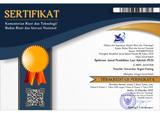Contribution of Interest in Learning and Learning Environment to Learning Outcomes of Training Participants at the Job Training Center (BLK) Padang City
 ), Irmawita Irmawita(2),
), Irmawita Irmawita(2), (1) Universitas Negeri Padang
(2) Universitas Negeri Padang
 Corresponding Author
Corresponding Author
DOI : https://doi.org/10.24036/spektrumpls.v9i4.113840
Full Text:
 Language : id
Language : id
Abstract
Learning outcomes are the acquisition of learning carried out during the training and their competence tested at the end of the training period. Training with interests will get more results than no individual interests. The learning environment becomes important during the teaching and learning process for participants who take part in the training at the Job Training Center. This research was conducted with the aim of knowing the Contribution of Learning Interest and Learning Environment to the Learning Outcomes of Training Participants at the Job Training Center (BLK) Padang City. The type of research used is quantitative research while the method is associative. The population is BLK Padang training participants for the period 1 of 2021 in 18 vocational schools totaling 288 participants with a sample of 74 people. Data collection techniques in the form of questionnaires with data collection tools in the form of questionnaires and documentation. The data analysis technique is percentage, then continued with categorization through the respondent's achievement level formula and hypothesis testing using the t-test formula. The results of the analysis of interest in learning obtained the value of tcount > ttable, namely 8,613 > 1,987 with a significant result of 0.000 < 0.05, this illustrates that there is a significant influence between interest in learning and learning outcomes. Then the learning environment is obtained from the value of tcount > ttable, namely -6.384 < 1.987 with a significant result of 0.000 < 0.05, this illustrates that there is a significant influence between the learning environment on learning outcomes. By using a one-way test so that the results are Ho is accepted and Ha is rejected. This proves simultaneously (together) interest in learning and the learning environment has a significant influence on learning outcomes.
References
Ahmadi, A. (2004). Psikologi Pendidikan. Rineka Cipta.
Dimyati, M. (2010). Belajar dan Pembelajaran. PT. Rineka Cipta.
Djaali. (2011). Psikologi Pedidikan. Bumi Aksara.
Djamarah, S. B. (2015). Psikologi Belajar. Rineka Cipta.
Fitri, N., & Jamna, J. (2019). IMPLEMENTATION OF ON JOB TRAINING ( OJT ) THROUGH COOPERATION WITH THE WORLD OF Deskripsi Data Tentang Pelaksanaan On Job Training ( OJT ) pada Tahap Persiapan. 1Jurusan Pendidikan Luar Sekolah Fakultas, 7(3). https://doi.org/10.24036/spektrumpls.v2i3.106172
Ghozali, I. (2005). Aplikasi Analisis Multivariate dengan SPSS. Badan Penerbit UNDIP.
Hadis, A., & Nurhayati. (2010). Psikologi Pendidikan. Rineka Cipta.
Hamalik, O. (2012). Pengembangan Kurikulum. Remaja Rosdakarya.
Hamalik, O. (2013). Proses Belajar Mengajar. Bumi Aksara.
Lestari, I. (2015). Pengaruh waktu belajar dan minat belajar terhadap hasil belajar matematika. JFormatif: Urnal Ilmiah Pendidikan MIPA, 3(2).
Maesyarah, A. A. (2018). ANALISIS EFEKTIVITAS PERAN BALAI LATIHAN KERJA (BLK) DALAM MENINGKATKAN KUALITAS TENAGA KERJA MENURUT PRESPEKTIF EKONOMI ISLAM (Study Pada UPTD Balai Latihan Kerja (BLK) Kalianda). 44. http://ir.obihiro.ac.jp/dspace/handle/10322/3933
Pradja, J. S. (2012). Ekonomi Syariah. Pustaka Setia.
Sagala, S. (2013). Konsep dan Makna Pembelajaran. Alfabeta.
Sitoresmi. (2015). Pengaruh Lingkungan Sekolah dan Kesulitan Belajar Terhadap Motivasi Belajar. (Skripsi). Universitas Muhammadiyah Surakarta.
Slameto. (2015). Belajar dan Faktor-faktor yang Memengaruhinya. Rineka Cipta.
Sugiyono. (2012). Metode Penelitian Kuantitatif, Kualitatif dan R & D.Bandung:Alfabeta.
 Article Metrics
Article Metrics
 Abstract Views : 131 times
Abstract Views : 131 times
 PDF Downloaded : 47 times
PDF Downloaded : 47 times
Refbacks
- There are currently no refbacks.

This work is licensed under a Creative Commons Attribution-NonCommercial 4.0 International License.



